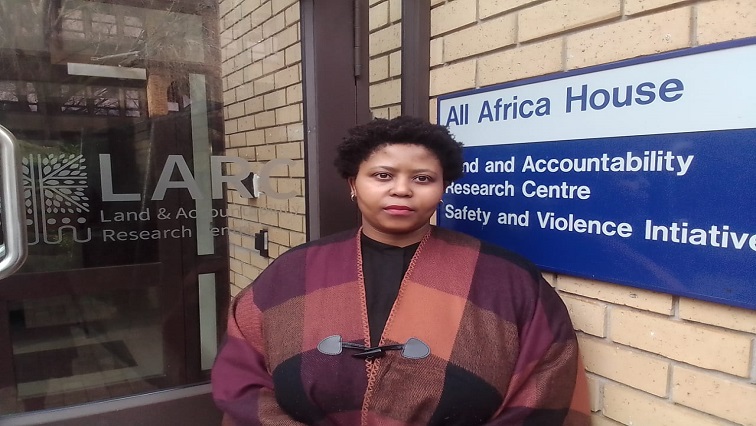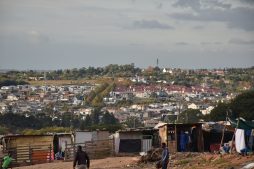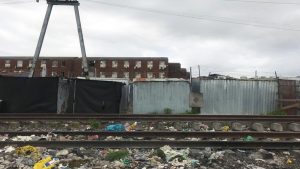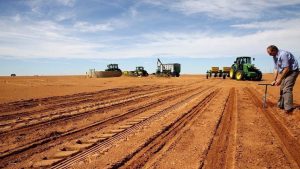Monday June 19th, marks 110 years when the 1913 Natives Land Act was enacted in the then Union of South Africa. It prohibited Natives from owning, leasing or acquiring land. The Act was repealed in June 1991.
The passing of the 1913 Natives Land Act marked the beginning of the formal dispossession of land in South Africa.
Sol Plaatjie, founder of the then African Natives Congress, now known as the ANC, unsuccessfully challenged the British Government to scrap the legislation, a year after the Act became law.
When apartheid was enacted in 1948, land dispossession continued.
Resident of District Six in Cape Town were some of the casualties of forced removals.
Chrischene Julius from the District Six Archives division says, “On the 11th February 1966, District Six was declared a White Group area and that essentially mean that District Six was declared White, and all Black people had to leave the city. About 60 odd dozen people were forced to leave. What you see behind me is really the images of people from District Six as the area was being demolished. So, it’s images of young high school students who would go to school and in turn would take photographs of the buildings that would be demolished around them.”
District Six beneficiaries
Hundred-year-old Zubeida Hendricks is one of the District Six beneficiaries under government’s restitution programme. Her daughter Zahra Nordien says her mother almost gave up after struggling for many years to claim back what she was dispossessed of.
Nordien says she had to take up the fight for her mother.
“Practically, every week I was at the Land Claims Commission to come and enquire about her claim. And she was given the key in 2013. Then she was very, very happy to move back to District Six. That was her wish to come back to District Six. She is today a 100 years old. Next month she will be a 101 and she is still in District Six. She is actually the oldest community member in the area.”
Zahra, who is also the chairing the District Six Committee, says the slow progress in resettling many of the claimants remains a concern.
“The process is still very, very slow. There is still 975 units that national needs to build for the early claimants. Then the District Six Working Committee has 3000 late claimants. The District Six Working Committee took government to court because of the slow process, and we won the court case. And that is why there is progress now of claimants moving back to District Six”
For some of the youth of District Six they want to see more resettling and reintegration in the area.
“Possibly to let all the original, not the original, but the people who lived in District Six before, the previous people who lived here in the old District Six before they bulldozed it. So, I would like to see that people coming back to live here again and to claim their land,” says one youth.
“They could at least like make a change because like as you can see over there on that side behind the Mosque there is a squatter camp. And there is a squatter camp over there, so if they can just at least just give the people like proper houses instead of putting tents because I don’t like seeing people like that, for me it’s heartbreaking to see people like that, because no one deserve to live like that. Everyone deserves to be treated equally,” added another District Six youth.
Proper land and decent housing
From District six to Zwezwe Informal Settlement near Dunoon along the N7, others just want to get a proper piece of land and decent housing
“It’s not healthy to be honest, because I think this land is not enough, because these were graves, but we are building houses here, because we got no place to stay, we don’t have money for rent. So, this area just sucks. It’s not good for our people we got kids and there is a farm here, but even people are staying here in this area. So, it’s not right at all”, says one resident.
Another one says, “If we can stand in unity and if we can stand as one, I’m definitely sure that we will be able to bring the land back to where it should be. Secondly, is making the correct decisions and thirdly the biggest problem that we have and we all know, it’s corruption.”
“As they say this is an informal settlement, we just want the temporary housing here so that we can stay at a safe place. Even our Children, who are about to go to school, they can’t, because it’s raining the transport can’t go in when it’s raining. The transport won’t come in because it’s raining. As you see there are the dams all over, so the road is not good at all,” concluded a third resident from Zwezwe.
Although Zwezwe is a wetland area, not suitable of habitation, and without water and sanitation, others have become creative. Zuko Khalipha was spotted preparing a rubbish dump section to use for food security
“I tried here to make level for a garden. I’m gonna plant spinach and onion. I am gonna take other stuff, onions to support the people here who have creche’s here (at) Zwezwe. I have compost, you see there? After I have finished to make level, I’m gonna put compost also sand. I’m gonna start (planting) this month because I am supposed to make level there. I’m gonna start in this month.”
Land debate remains a thorny issue
The Land and Accountability Research Centre (LARC) at the University of the Cape Town reflects on the lack of progress in addressing the land question 110 years later and in a democracy. Nolundi Luwaya who is the Director at LARC explains.
“So, looking back I think the progress has unfortunately been slow, especially in the last 30 years, despite the constitutional commitment to land reform and the fact that the Land Reform programme is laid out in the constitution. It consists of three steps. One is to secure the tenure of people. Two is to redistribute the land which is about changing the nature of ownership and who holds land in South Africa and the third part of course is restitution which is returning land to people who have been dispossessed. All three of those programmes have really struggled to make an impact and changing the landscape, the picture of land ownership in South Africa and the strength of land rights in South Africa.”
“For communities in the former homelands it’s been a particularly slow process because they have had to work harder because customary law of course also has to try and catch up with the law system that has been the dominant format and framework for land rights for you know, hundreds of years, and so you know even though we are not in the same position as we were when the 1913 Land Act 110 was passed, I would say that despite a hundred years having passed, progress is very slow”, Luwaya added.
The debate on land ownership continues to be a thorny issue for some lawmakers. The Pan Africanist Congress (PAC) is one of the parties that has been at the forefront of the land debate. PAC Leader, Mzwanele Nhyontso says land ownership remains skewed since colonialism and has not changed.
“110 years, 13 years whatever, we are still where we are in 1913 or 1652. 29-years in the so-called democracy it is worse. I don’t even think we are still holding onto 13%. I think we are at 8% now. Every land is being taken by white people. Even our own government could not just address the land question. So there is nothing about 1913 that has changed. Land remains in the hands of the white people.”
But another party, the Freedom Front Plus (FF-Plus) has always disputed the patterns of land ownership in South Africa.
“The statement to say that 87% of the land was owned by whites is not correct. The moment we talk about hectares, we must realise, If for instance to the Karro, if you have a farm there less than 10 000 hectares, you cannot farm. You can’t do anything with the land. It is not productive, so that is not a correct way to see land reform. In fact, there is statistics that is actually shown that if you take urban land and you include it, then you will find between 66 and 70% of land is actually occupied by black people. But yes, the government doesn’t want to give them title deeds. So that’s a problem”, says FF-Plus Leader Pieter Groenewald.
As the debate over the legacy of the Land Act rages on, the United Democratic Movement (UDM) has rejected the Expropriation Bill for not making provision for the restoration of land stolen before 1913.
UDM Chief Whip, Nqabayomzi Kwankwa says land was not only dispossessed after 1913.
“Land dispossession in South Africa did not start in 1913. It started way back. You will recall that all the chiefs in our country in all the different provinces fought against land dispossession. And some of the people were removed from their own land during those periods, long before 1913. We did say even during that committee that dealt with the Expropriations Committee, that it did not go back far enough and because of that reason we did not support any initiatives that came out of it. It’s almost like they wanted to cater for those who were removed, starting from 1913 to date. All the chiefs fought against land dispossession in the country. You have to check even in the Eastern Cape alone when you talk about the land frontier wars, the wars against land dispossession lasted for hundred of years.”
Can the land question be addressed 110 years later, and how can this be done by government?
“They don’t have political will to address the land question. They are invertebrates. They are cowards, they can’t address the land question. Even when they tabled the so call Land Expropriation Bill with or without compensation, we said it that it was just a political gimmick, they were not going to address it. (In) their own Bill, they knew it was not going to succeed. Most of their members were not even in Parliament on that day, because they don’t take the land question seriously, why? they are scared of their handlers, they are scared of the Western world, they are scared of the white people, they can’t address it. Yes, the PAC believes that land must be repossessed”, says Nhyontso.
“The view of the Freedom Front Plus when to comes to land reform, we firstly say we must go and look at state owned land. And if you want to redistribute, use those land, and then you redistribute it. Secondly, we said the civil servants of the department of land reform must be competent people and they must ensure that the corruption in that process of land reform must be removed, because there is lot of corruption when it comes to land reform. Thirdly, we also say that we believe in the principle of the fact that people should freely avail their land for land reform, and that will be able to give people the opportunity to farm with a mentor for instance, to ensure that they develop the skills to be a farmer”, Groenewald emphasised.
When the Deputy President, Paul Mashatile, faced oral questions in the National Council of provinces (NCOP) on 14 June 2023, he acknowledged that the land question remains a thorny debate.
“I did indicate the last time I spoke, I can’t remember if it’s in this House, that we have accepted ourselves as the governing party that land reform has been slow, but I don’t think we should give the impression that nothing has happened. If you look at the figures out there, I won’t quote most of them, but for instance a total of 552 000 households have benefitted from land reform programmes, with 174 000 being female-headed households. 1240 household headed by persons with disabilities. 700 000 hectares of state land has been identified and distributed as early as 2020. So, there is a lot honourable member that is happening, but you’ll recall that as we get involved in land reform, redistribution and restitution, we are also doing transformation.”
Mashatile says some of the challenges to fast track restitution are caused by various factors.
“One of the challenges is sometimes because of disputes from land claimants within families or sometimes even communities who don’t just agree on the use of land or who belong to that particular area. And those tend to delay the programme of land reform to ensure that people get back their land through redistribution or restitution. But we are addressing that. I think it is in our interest to ensure that people do access land as quickly as is possible.”
Meanwhile, the Land and Accountability Research Centre’ believes that policy implementation and resources are key to fast tracking and addressing the land question.
“What we really need is some creative thinking around law and policy. We really need the government to put effort, finances, resources, and manpower behind developing laws that can provide adequate protection pf people. When it comes to customary land rights, we do have a law in place, that’s called the Interim Protection of Informal Land Rights Act. If the state were for example to work on making that a permanent piece of legislation with regulations that could support its implementation, that could make a massive impact. The departments of agriculture, land reform and rural development is massively under resourced. And so, it would be a big vote of confidence if the state were to ensure that that department is well resourced so that it could take the job that it needs to. And we need to make sure that the laws that protect the farmworkers from evictions, are being followed and implemented. So, really, we need a bit of state might. You know, we need them to put their money where their mouths are.”
Monday marks the anniversary of the infamous Native Land Act of 1913:






